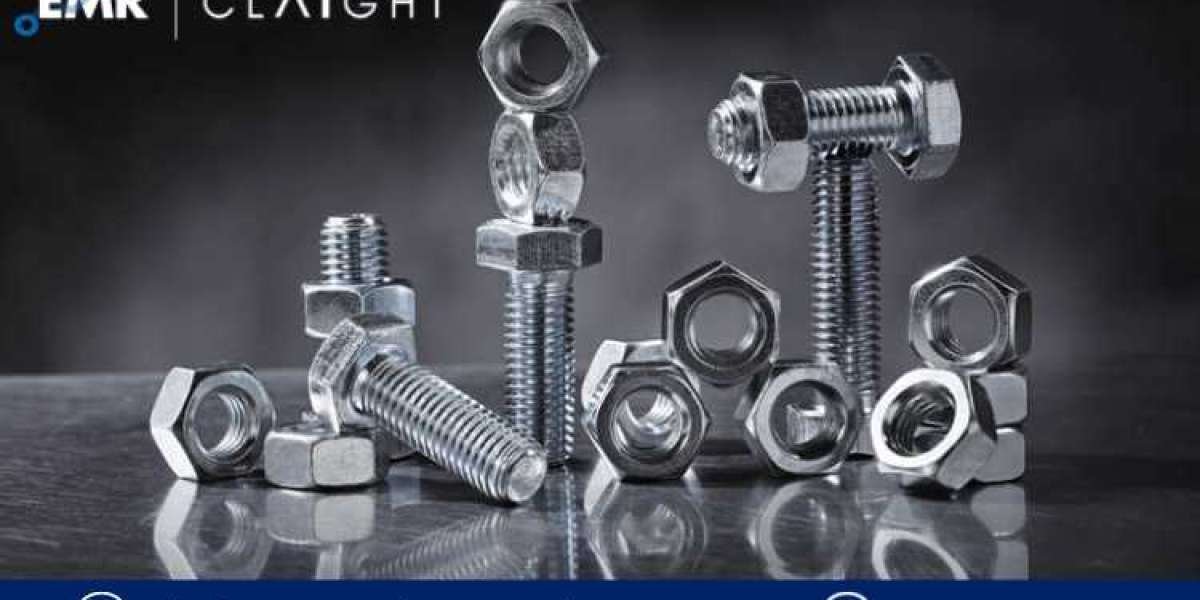The global industrial fasteners market is expected to grow at a CAGR of 4.10% between 2024 and 2032, according to a report by Expert Market Research (EMR). This growth is driven by the rising demand for industrial fasteners across multiple sectors such as construction, automotive, aerospace, and machinery, with an increasing focus on high-performance, corrosion-resistant, and cost-effective fastening solutions. As industries evolve towards more complex structures, the need for advanced and durable fasteners to support these systems continues to surge.
Industrial fasteners play a crucial role in assembling and securing parts in a wide array of products, ranging from automobiles to heavy machinery. With technological advancements and innovations in materials, fasteners have become stronger, lighter, and more adaptable, driving demand across various industries. Additionally, the increasing industrialization and the development of infrastructure, especially in emerging markets, are expected to significantly contribute to market growth.
In the construction sector, for instance, industrial fasteners are indispensable for securing structural components, electrical systems, and insulation materials, leading to a surge in their demand as building projects become more complex and large-scale. Similarly, the automotive industry requires fasteners that can withstand extreme temperatures and stresses, contributing to innovations in fastening technologies such as self-locking and vibration-resistant fasteners.
Furthermore, as the aerospace sector continues to demand greater performance and safety standards, the market for industrial fasteners is poised to witness increased growth. Aerospace fasteners must meet strict tolerances and be made from advanced materials, driving a trend towards the development of high-performance and lightweight fasteners that are also cost-efficient.
Another factor boosting the industrial fasteners market is the rise of automation in manufacturing and assembly lines. Fasteners used in automated systems are engineered for precision, repeatability, and durability, offering a competitive advantage to manufacturers seeking efficiency gains. Moreover, the growing shift towards sustainable production processes is encouraging manufacturers to explore eco-friendly materials and recycling options for fasteners.
As the market grows, it is crucial for manufacturers to focus on product innovation, supply chain management, and sustainability to meet the evolving demands of industries worldwide. Environmental regulations and the need for sustainable solutions in industries such as construction and automotive are likely to influence product development in the coming years.
Get a Free Sample Report with Table of Contents
Market Segmentation
The global industrial fasteners market can be segmented based on type, application, distribution channel, and region.
Market Breakup by Type
- Bolts
- Screws
- Nuts
- Washers
- Rivets
- Pins
- Others
Each type of industrial fastener is designed for specific applications, with varying sizes, materials, and durability levels to meet the requirements of different industries. For example, bolts and screws are commonly used in construction and automotive applications due to their strength and ability to withstand high stress, while rivets and pins are used in aerospace for secure and permanent fastening solutions.
Market Breakup by Application
- Automotive
- Construction
- Aerospace
- Machinery and Equipment
- Electrical and Electronics
- Others
In the automotive industry, fasteners are critical in the assembly of components like engines, bodywork, and interior fixtures, and the growing demand for lightweight materials and electric vehicles is spurring the demand for innovative fasteners. In construction, fasteners are indispensable for joining structural elements, particularly in building skyscrapers, bridges, and residential complexes. Meanwhile, aerospace applications demand fasteners that meet stringent quality and safety standards, driving innovation and growth in this sector.
Market Breakup by Distribution Channel
- Direct Sales
- Online Sales
- Third-Party Retailers
The distribution channel plays a significant role in shaping the industrial fasteners market. Direct sales through manufacturers allow for custom orders and bulk purchases, especially in the case of large-scale projects like construction or automotive production. Meanwhile, online sales and third-party retailers cater to smaller businesses and DIY enthusiasts who need fasteners for smaller, individual projects.
Market Breakup by Region
- North America
- Europe
- Asia Pacific
- Latin America
- Middle East and Africa
North America and Europe hold significant market shares due to the presence of key industries like automotive, aerospace, and machinery, which rely heavily on fasteners. The Asia Pacific region, however, is expected to witness the highest growth rate during the forecast period, driven by rapid industrialization, infrastructure development, and a booming manufacturing sector in countries like China, India, and Japan. Latin America and the Middle East are also emerging as important regions for industrial fasteners, with increasing investments in construction and automotive sectors.
Competitive Landscape
The competitive landscape of the global industrial fasteners market is highly fragmented, with numerous local and international players vying for market share. Leading companies in the industrial fasteners market are focusing on product innovation, strategic partnerships, and mergers and acquisitions to expand their offerings and geographic presence.
Key players in the global industrial fasteners market include:
- Stanley Black Decker, Inc.
- Illinois Tool Works Inc. (ITW)
- Arconic Inc.
- Fastenal Company
- Sundram Fasteners Limited
- Nucor Corporation
- Bulten AB
- LISI Group
- Atlas Copco AB
- Würth Group
These companies are leveraging their extensive product portfolios and strong distribution networks to cater to the growing demand for industrial fasteners. With a focus on innovation and sustainability, these industry leaders are investing in research and development to create fasteners that offer superior performance, increased durability, and reduced environmental impact.
Key Market Developments
- Product Innovations: Companies are increasingly focusing on developing fasteners with enhanced properties such as corrosion resistance, high tensile strength, and resistance to extreme environmental conditions. For instance, innovations in stainless steel and titanium fasteners are becoming more prevalent due to their ability to withstand harsh operating conditions.
- Sustainability Efforts: There is a growing emphasis on sustainable manufacturing processes and materials in the fasteners market. Companies are incorporating recycled materials and eco-friendly production methods into their fastener designs to meet both regulatory requirements and consumer demand for environmentally conscious products.
- Strategic Acquisitions: Many market players are expanding their product offerings and global reach through strategic acquisitions. For example, the acquisition of smaller fastener manufacturers by larger corporations allows for access to new markets, technologies, and customer bases.
- Regional Expansion: Players are increasingly focusing on emerging markets in Asia-Pacific, Latin America, and the Middle East to tap into the growing demand for fasteners driven by industrialization and infrastructure development.
- Customization: As industries become more specialized, there is a growing need for custom-made fasteners. Companies that can provide tailored solutions for specific applications, such as aerospace or automotive, are gaining a competitive edge in the market.
Explore Trending Reports:
North America PVC Pipes Market: https://www.expertmarketresearch.com/reports/north-america-pvc-pipes-market
Peru Functional Food Market: https://www.expertmarketresearch.com/reports/peru-functional-food-market
Philippines Structural Insulated Panels Market: https://www.expertmarketresearch.com/reports/philippines-structural-insulated-panels-market
Key Drivers and Challenges
Key Drivers
- Growing Industrialization and Infrastructure Development: The demand for industrial fasteners is closely tied to the growth of manufacturing and construction sectors globally. Emerging economies, particularly in Asia-Pacific, are investing heavily in infrastructure, boosting the demand for fasteners.
- Technological Advancements: Innovations in materials and manufacturing processes are creating new opportunities for fasteners with superior performance characteristics, such as enhanced corrosion resistance and high tensile strength.
- Automotive Industry Growth: The automotive sector's shift towards electric vehicles (EVs) and lightweight materials is driving demand for specialized fasteners that can meet new engineering requirements.
- Aerospace Industry Expansion: Aerospace applications demand high-precision and high-strength fasteners that can withstand extreme environmental conditions, further fueling market growth.
Key Challenges
- Fluctuating Raw Material Prices: The price of key materials like steel, aluminum, and titanium can vary significantly, impacting the cost of producing industrial fasteners and affecting profitability.
- Environmental Regulations: The growing pressure for manufacturers to comply with stringent environmental regulations may increase production costs and require investments in more sustainable manufacturing processes.
- Supply Chain Disruptions: Geopolitical tensions, natural disasters, and the global pandemic have highlighted the vulnerability of global supply chains, potentially leading to delays in the production and distribution of fasteners.
- Competition from Low-Cost Manufacturers: While high-quality fasteners are in demand, competition from low-cost manufacturers, particularly in Asia, poses a challenge to established players in the market.
The global industrial fasteners market is expected to experience steady growth in the coming years, driven by increasing industrialization, technological innovations, and demand from key industries such as automotive, aerospace, and construction. Companies focusing on product innovation, sustainability, and strategic partnerships will be well-positioned to capture market share and meet the evolving needs of industries worldwide. However, challenges such as fluctuating raw material prices and supply chain disruptions will require careful navigation. As the market grows, manufacturers will need to continuously adapt to changing consumer preferences, technological advancements, and regulatory requirements to remain competitive.













